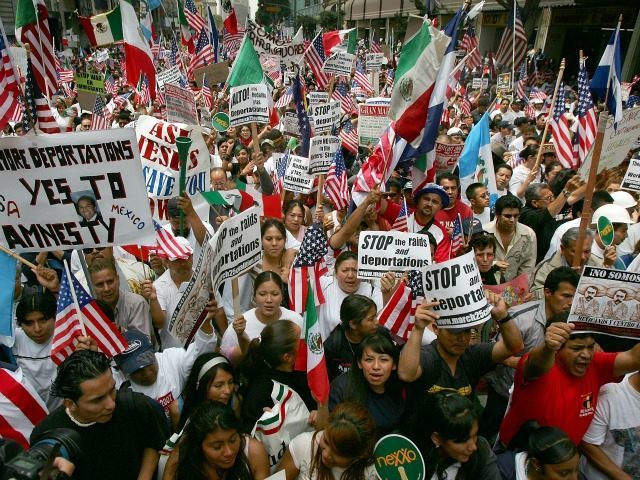“Immigration reform” is once again in the public spotlight. Hillary Clinton is a presidential candidate who has vowed to implement comprehensive immigration reform in her first 100 days, while Donald Trump has declared there would be no amnesty for undocumented immigrants. Regardless of the result in November, pro-amnesty advocates will continue to push for dramatic change. But what exactly is amnesty, and how does it affect American citizens?
Black’s Law Dictionary defines amnesty as “A pardon extended by the government to a group or class of persons . . . the 1986 Immigration Reform and Control Act provided amnesty for undocumented aliens already present in the country.” Whether the illegal immigrants pay a fine or back taxes (which is not enforceable) is irrelevant to the definition of amnesty.
Rewarding illegal immigrants with amnesty ignores Americans’ opposition and also ignores the massive flood of illegal immigration that has already resulted from the policies of the Obama Administration. A recent Rasmussen poll found that 54 percent of likely voters oppose the president’s executive order allowing nearly five million illegal immigrants to remain in the country legally and apply for jobs.
Furthermore, another call for amnesty disregards its costs. Open borders proponents claim that more legal immigration and the legalization of millions who are in the country illegally will help the economy. But the numbers on which they rely only counts part of the price that Americans must pay.
Amnesty advocates refuse to acknowledge that increased competition from foreign, often lower-skilled, workers drives down wages and opportunities for American workers. The Congressional Budget Office (CBO) projected that granting amnesty to millions of illegal immigrants reduces average wages for the entire labor force, especially among less-skilled American workers.
They also ignore the costs of added government services at all levels. Lower-skilled immigrants, including illegal immigrants and their children, access many federal benefit programs.
A recent study by the Center for Immigration Studies found that illegal immigrant households on average account for 35 percent of the annual costs of federal welfare programs. The same report determined that legal immigrants account for 38 percent of welfare costs, while native households comprise only 27 percent of the costs.
Local programs, social services, and educational programs are burdened to the detriment of taxpayers. According to a study by the Federation for American Immigration Reform (FAIR), the total costs of illegal immigration to state and local governments is about $84 billion per year. The largest of these costs borne by state and local taxpayers is education. FAIR estimates the costs to educate the children of illegal immigrants at over $45 billion annually.
Supporters of amnesty argue that a major benefit is millions more paying into the Social Security system, which they say will ensure its solvency for generations. However, this claim fails to consider the costs of paying future benefits to millions of illegal immigrants. A few years ago, the Social Security Administration ran the numbers on such a scenario at my request.
Here’s what they found: For a single 25-year old male with very low earnings, today’s value of his and his employer’s contributions to the Trust Fund will fall $15,596 short of the value of the Social Security retirement benefits he will eventually receive. A single female will receive $20,936 more in benefits than she pays into Social Security.
If the immigrant is married but the sole wage-earner, the couple will eventually drain Social Security by $52,460; if the immigrant is married to another very low earner, the drain will be $39,037. The legalization of one million illegal immigrant couples who work for very low wages would be a $101 billion blow to Social Security. And amnesty for millions of illegal immigrants would multiply this figure many times! This will hasten the time when Social Security becomes insolvent.
Stagnant wages, more unemployment, increased consumer prices, and higher taxes to fund the increased demand for government programs are all adverse impacts of higher levels of legal and illegal immigration.
Amnesty punishes hardworking Americans and taxpayers. The many costs of amnesty are simply too high.
Congressman Smith (R-TX) serves as chairman of the House Science, Space, & Technology Committee, is also a member of the Committee on Homeland Security, and is a former chairman of the House Judiciary Committee.

COMMENTS
Please let us know if you're having issues with commenting.